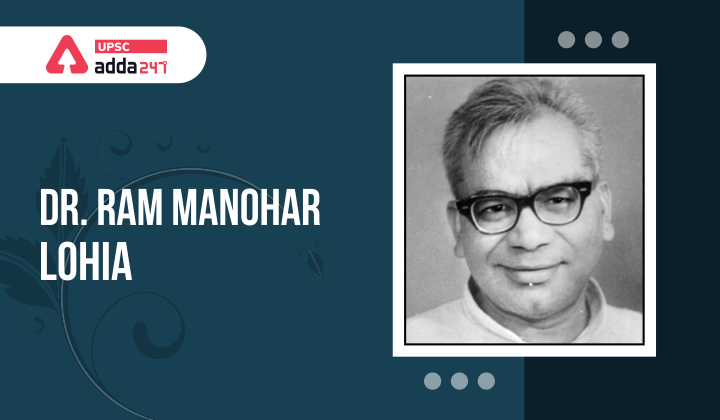Table of Contents
Ram Manohar Lohia was born on 23 March 1910 in Akbarpur, Uttar Pradesh, his father, Hira Lal, was a committed nationalist and follower of Mahatma Gandhi, Lohia believed in a socialist ideology, his ideas, especially about socialism and working closely with local communities, still influence many leaders today. As a strong critic of both colonial rule and centralized power, Lohia’s legacy reminds us of the importance of fairness, social justice, and standing up against all forms of oppression., we will be discussing about Dr. Ram Manohar Lohia and his contributions in this article.
Early Life and Education of Ram Manohar Lohia
As we discussed above that Lohia was born on 23 March 1910 in Akbarpur, in a Bnaiya Marwadi family, his family commitment towards the freedom struggle motivated him to contribute in the freedom struggle. Lohia moved to Bombay for his schooling and then to Calcutta for pursuing BA from Vidya Sagar University then for his higher studies he moved to Germany and earned a Ph.D in Economics.
While studying at the Frederic William University he published his thesis on the topic of “Salt Taxation in India” and laid the foundation for his lifelong opposition to economic exploitation.
Lohia and Freedom Struggle
After completing his studies he became actively involved in the nationalist movement, he believed that economic inequality was the root cause of social injustice. He was a founder of the Congress Socialist Party (CSP) and advocated for a decentralized form of socialism that was in harmony with Indian traditions. Lohia’s brand of socialism aimed to uplift the underprivileged sections of society, including the working class, women, and Dalits.
Lohia was instrumental in mobilizing masses for the Quit India Movement in 1942, which led to his imprisonment for over a year, he had worked with Mahatma Gandhi and Jawahar Lal Nehru and was among prominent leaders of the Indian National Congress.
Lohia’s Role in Quit India Movement
Lohia coordinated underground efforts and used secret radio broadcasts to keep the movement alive after many leaders were imprisoned. His innovative use of underground radio helped spread the Quit India message across the country, urging continued resistance. Lohia was arrested and imprisoned for over a year due to his involvement, but his dedication remained unwavering. His leadership and efforts significantly contributed to India’s eventual independence in 1947, it was Lohia who played an important role in the Quit India Movement of 1942, actively organizing protests and mobilizing the masses against British rule along with Mahatma Gandhi and Nehru.
Contributions of Ram Manohar Lohia
Lohia proposed a vision for India’s future that he called the “Seven Revolutions” (Sapta Kranti). These revolutions included:
- Equality between the rich and poor
- End of caste-based discrimination
- Gender equality
- End of colonialism and imperialism
- Protection of individual freedoms
- Economic equality
- Global peace and the abolition of nuclear weapons
Also he wrote the below mentioned books;
- The Caste System
- Foreign Policy
- Guilty Men of India’s Partition
- India, China, and Northern Frontiers
- Fundamentals of a World Mind
- Interval During Politics
- Marx, Gandhi and Socialism
- Bandh Samrat
Lohia and Post Independence
Lohia criticized Nehru and the policies of Congress, with his slogan, “30 crores on 30 rupees a day,” Lohia condemned the increasing inequality in post-independence India. He argued that Nehru failed to address the problems of the poor and continued many of the colonial practices that India had fought to abolish.
In 1954, Lohia parted his ways with the Congress and founded the Praja Socialist Party (PSP) to advocate for governance at the grassroot level to encounter the problems faced by the poor and those left unsighted by the Nehru led Congress government.
Criticism and Challenges Faced by Dr. Ram Manohar Lohia
Lohia faced the following criticism and challenges –
- Political : his opposition to the Nehru led government backlashed resulting into his political isolation.
- Economic : Lohia’s advocacy for not pertaining to both capitalism and communism and sticking to socialist ideology was considered to be radical by his critics.
Apart from the political and economic challenges Lohia also struggled for winning elections but he finally won in 1963 from farukkabad.
Death of Ram Manohar Lohia
Ram Manohar Lohia passed away on October 12, 1967, because of medical negligence wherein a stich was not done properly during an old operation which led to excessive bleeding leading to his death, but his legacy continues to inspire political discourse in India. His ideas on socialism, equality, and the need for systemic reform are still debated and valued in Indian politics.



 Sources of Mauryan History: Literary and...
Sources of Mauryan History: Literary and...
 List of Major Sites in Indus Valley Civi...
List of Major Sites in Indus Valley Civi...





